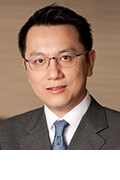Professor TSE Wai Choi, Eric

S.H. Ho Professor of Haematology and Oncology
Clinical Professor
- BSc(BiomedSc)(HK), MBBS(HK), PhD(Cantab), FRCP, FRCP(Edin), FRCP(Glasg), FRCPath, FHKCP, FHKAM(Medicine)
| ewctse@hku.hk | |
| 2255-3975 | |
| HKU Scholar Hub |
Biography
Professor Tse is Clinical Professor and Specialist in Haematology and Haematological Oncology. He graduated MBBS with John Anderson Gold Medal from the University of Hong Kong. He also received his doctorate training from the University of Cambridge, and was awarded Max Perutz Research Prize by the MRC Laboratory of Molecular Biology, Cambridge. Upon completion of clinical training, Professor Tse has been appointed honorary consultant physician in the Department of Medicine, Queen Mary Hospital.
His basic and translational research focus on the development of novel therapeutic approach in cancer treatment through identifying potential targets and understanding the fundamental biology of cancer cell. Professor Tse has pioneered the development of intracellular antibodies in the therapy of cancer during his early stage of career. He is currently examining the role of peptidyl-prolyl-isomerase PIN1 and investigating the therapeutic potential of arsenic trioxide in cancers. In addition to his laboratory work, Professor Tse is also active in clinical research on lymphoid neoplasms and cancer-associated thrombosis.
His basic and translational research focus on the development of novel therapeutic approach in cancer treatment through identifying potential targets and understanding the fundamental biology of cancer cell. Professor Tse has pioneered the development of intracellular antibodies in the therapy of cancer during his early stage of career. He is currently examining the role of peptidyl-prolyl-isomerase PIN1 and investigating the therapeutic potential of arsenic trioxide in cancers. In addition to his laboratory work, Professor Tse is also active in clinical research on lymphoid neoplasms and cancer-associated thrombosis.
Selected Publications
1. Lymphoid neoplasms
- Kwong YL, Kim SJ, Tse E, Oh SY, Kwak JY, Eom HS, Do YR, Mun YC, Lee SR, Shin HJ, Suh C, Chuang SS, Lee YS, Lim ST, Izutsu K, Suzuki R, Relander T, d'Amore F, Schmitz N, Jaccard A, Kim WS. Sequential chemotherapy/radiotherapy was comparable with concurrent chemoradiotherapy for stage I/II NK/T-cell lymphoma. Ann Oncol. 29(1):256-263, 2018
- Reddy A, ……, Tse E, ……, Dave SS. Genetic and Functional Drivers of Diffuse Large B Cell Lymphoma. Cell. 171(2):481-94, 2017.
- Kwong YL, Chan TS, Tan D, Kim SJ, Poon LM, Mow B, Khong PL, Loong F, Au-Yeung, R, Iqbal J, Phipps C, Tse E. PD1 blockade with pembrolizumab is highly effective in relapsed and refractory NK/T-cell lymphoma failing L-asparaginase. Blood. 129(17):2437-2442, 2017.
- Tse E, Kwong YL. T-cell lymphoma: microenvironment-related biomarkers. Semin Cancer Biol. 34:46-51, 2015.
- Tse E and Kwong YL. How I Treat NK/T-cell Lymphoma. Blood. 121(25):4997-5005, 2013.
2. Peptidyl-prolyl-isomerase PIN1
- Cheng CW, Leong KW, Ng YM, Kwong YL, Tse E. The peptidyl-prolyl isomerase PIN1 relieves cyclin-dependent kinase 2 (CDK2) inhibition by the CDK inhibitor p27. J Biol Chem. 292(52):21431-21441, 2017
- Leong KW, Cheng CW, Wong CM, Ng IO, Kwong YL, Tse E. miR-874-3p is downregulated in hepatocellular carcinoma and negatively regulates PIN1 expression. Oncotarget. 8(7):11343-11355, 2017.
- Cheng CW, Chow AK, Pang R, Fok EW, Kwong YL and Tse E. PIN1 inhibits apoptosis in hepatocellular carcinoma through modulation of the anti-apoptotic function of survivin. Am J Pathol. 182(3):765-75, 2013.
- Pang R, Lee TKW, Poon RT, Fan ST, Wong KB, Kwong YL and Tse E. Pin1 interacts with a specific serine-proline motif of hepatitis B virus x-protein to enhance hepatocarcinogenesis. Gastroenterology. 132(3):1088-103, 2007.
- Pang R, Yuen J, Yuen MF, Lai CL, Lee TK, Man K, Poon RT, Fan ST, Wong CM, Ng IO, Kwong YL and Tse E. PIN1 over-expression and β-catenin gene mutations are distinct oncogenic events in human hepatocellular carcinoma. Oncogene 23(23): 4182-6, 2004.
3. Arsenic trioxide in cancer
- Zhou Y, Wang H, Tse E, Li H, Sun H. Cell cycle–dependent uptake and cytotoxicity of arsenic-based drugs in single leukemia cells. Anal Chem. 90(17):10465-10471, 2018.
- Piao WY, Chau D, Yue LM, Kwong YL, Tse E. Arsenic trioxide degrades NPM-ALK fusion protein and inhibits growth of ALK-positive anaplastic large cell lymphoma. Leukemia. 31(2):522-6, 2017.
- Chau D, Ng K, Chan TS, Cheng YY, Fong B, Tam S, Kwong YL, Tse E. Azacytidine sensitizes acute myeloid leukemia cells to arsenic trioxide by upregulating the arsenic transporter aquaglyceroporin 9. J Hematol Oncol. 8(1):46, 2015.
- Leung J, Pang A, Yuen WH, Kwong YL and Tse E. Relationship of expression of aquaglyceroporin 9 with arsenic uptake and sensitivity in leukaemia cells. Blood. 109(2):740-46, 2007.
4. Intracellular antibodies
- Tse E, Chung G and Rabbitts TH. Isolation of Antigen-Specific Intracellular Antibody Fragments as Single Chain Fv for Use in Mammalian Cells. In Methods in Molecular Biology: Embryonic Stem Cells: Methods and Protocols. Edited by K.Turksen. vol. 185: p433-446, 2002 (Eds. Turksen K) Humana Press Inc., Totowa, NJ
- Tse E, Lobato MN, Forster A, Tanaka T, Chung GT and Rabbitts TH. Intracellular Antibody Capture Technology: Application to selection of intracellular antibodies recognizing the BCR-ABL oncogenic protein. J. Mol. Biol. 317(1): 85-94, 2002.
- Tse E and Rabbitts TH. Intracellular antibody-caspase medicated cell killing: an approach for application in cancer therapy. Pro. Natl. Acad. Sci. USA. 97(22): 12266-71, 2000.
- Visintin M, Tse E, Axelson H, Rabbitts TH and Cattaneo A. Selection of antibodies for intracellular function using a two-hybrid in vivo system. Pro. Natl. Acad. Sci. USA. 96(21): 11723-8, 1999.
Research Funding
- GRF Award 2018-19. Research Grant Council, HK. “Targeting BCL6 in diffuse large B-cell lymphoma with arsenic trioxide”
- GRF Award 2014-15. Research Grant Council, HK. “Integrative approach for matching arsenic to proteins”
- GRF Award 2013-14. Research Grant Council, HK. “Extending the therapeutic application of arsenic trioxide in acute myeloid leukaemia”
Key Offices
- Assistant Dean (Enabling Platforms), LKS Faculty of Medicine, The University of Hong Kong. (since September 2018)
- Chairman, Institutional Review Board (IRB), HKU/HA HK West Cluster. (since March 2021)
- Chairman, Hong Kong Society of Haematology. (April 2014 – April 2016)
- Founding Chairman, Hong Kong Society for Thrombosis and Haemostasis



